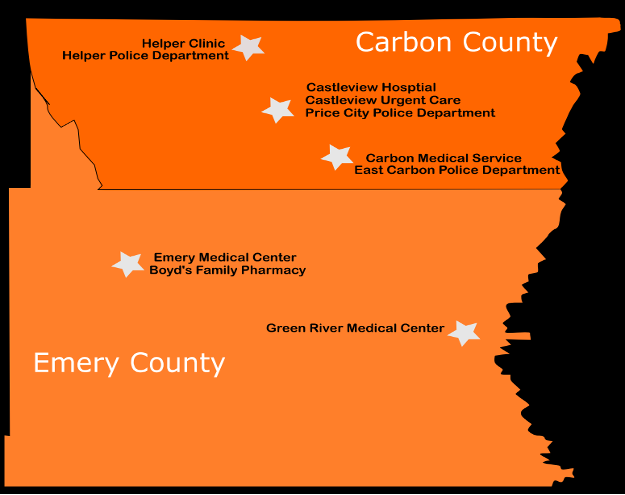By Kathryn Miller, Southeast Utah Health Department
In January of 2010, congress amended the “Controlled Substance Act” to provide for safe disposal of controlled substances. One reason cited in this act was that one third of people with a newly-acquired substance use disorder were between the ages of 12-17 (S. 3397, 2010).
In this age group, we see people with prescription substance use disorders more often than substance use disorders involving any other substance except marijuana and more than cocaine, heroin and methamphetamine combined. One cause for this increase in use is that teens have ready access to prescription medications because they can find them in their parent’s, grandparent’s and other family members’ medicine cabinets. This is a growing concern in the United States (S. 3397, 2010).
Before the Controlled Substances Act was enacted, responsible adults had few options for getting potentially deadly medications out of their homes, besides flushing them down the toilet or discarding them into the trash. Flushing medications and throwing them away are not safe methods of disposal. These substances can get into the ground water and drinking water when disposed of improperly. Many states, including Utah, have now established drug disposal programs or “take-back” programs. These programs help get medications out of the house and out of the reach of children and teenagers while keeping our drinking water safe (S. 3397, 2010).
Having unneeded medications in your home increases the risk of overdose for people coming into contact with those substances. The number of people experiencing unintentional overdoses and being transported to emergency rooms in the U.S. is growing significantly. For example, from 2001 to 2005, this increase was 114 % and admissions for treatment increased 74% from 2002 to 2006 (S. 3397, 2010).
The U.S. Department of Justice and Drug Enforcement Administration (DEA) has a National Prescription Drug Take-Back Day twice per year: in April and October. The Carbon & Emery Opioid & Substance Use Coalition, Southeast Utah Health Department (SEUHD) and other coalition members help with this Take-Back Day. The Take-Back Day on April 24 took back over 40 pounds from Carbon County and 25 pounds from Emery County for a total of 65 pounds!
There also are many locations where you can take unneeded medications year-round for safe disposal. Check out the DEA’s Take-Back Locations Finder in the Resources or see our quick reference sheet below. The next National Take-Back Day will be on Saturday, Oct. 23 from 10 a.m. to 2 p.m. We will have locations in Carbon and Emery counties, so make sure to mark your calendars!
Another way that you can help save lives is by carrying naloxone, brand name Narcan, to reverse an opioid overdose. Due to the growing number of opioid deaths, SEUHD now has Narcan Spray available. According to Narcan.com: “Narcan Spray may counteract the life-threating effects of an opioid overdose. Since most accidental overdoses occur in a home setting, it was developed for first responders, as well as family, friends and caregivers, with no medical training required.”
Narcan Spray is:
- Needle-free
- Designed for ease-of-use in the community setting
- Inhalation not required.
- Requires no specialized training (Emergent Biosolutions, 2020)
It is very IMPORTANT to know that if you use Narcan you must call 911 or get medical help immediately! Narcan only lasts a short time, so medical treatment is always necessary.
Southeast Utah Health Department (SEUHD) gives Narcan out to law enforcement, convenience stores, harm reduction clients, and anyone from the community who would like to carry it. Anyone can come in and get a box. It does not require a prescription; it is free and there are no questions asked. SEUHD does like to know if Narcan was used, but it is not necessary to report its use. For more information and to ask for your kit, you can call the SEUHD at (435) 637-3671.
Local Take Back Locations for Carbon & Emery Counties
| Carbon County:
Helper Clinic Helper Police Department Castleview Hospital Castleview Urgent Care Price City Police Department Carbon Medical Service East Carbon Police Department
|
Emery County:
Emery Medical Center Boyd’s Family Pharmacy Green River Medical Center
|
For more local substance use and recovery resources, check out our Carbon & Emery Resource Book:
https://extension.usu.edu/heart/resource-books
Resources
DEA’s Take-Back Locations Finder https://apps2.deadiversion.usdoj.gov/pubdispsearch/spring/main;jsessionid=4-vOabnTSjyVkE2mK2nQBviaklrvDFO1YjQ3YRSb.web1?execution=e1s1
References
3397 — 111th Congress (2009-2011): Secure and Responsible Drug Disposal Act of 2010. (2010, January 5). https://www.deadiversion.usdoj.gov/drug_disposal/non_registrant/s_3397.pdf
Emergent Biosolutions. (2020, August). Narcan Nasal Spray. https://www.narcan.com/.

